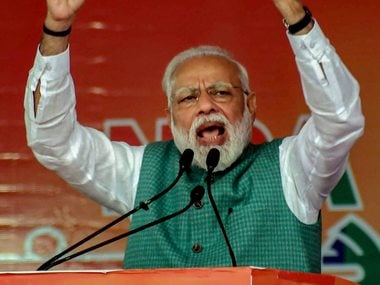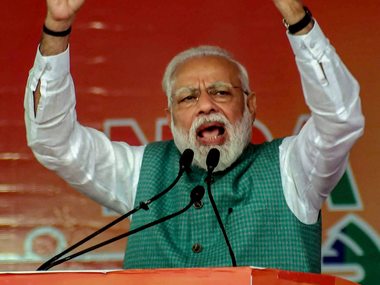Why does political consensus in India have a very short shelf-life when it comes to a response against Pakistan’s proxy war? This question assumes importance considering the political wrangling over the Balakot strikes and its aftermath. This wrangling is set to intensify as the polls draw near, and the emergent narrative may in some ways inform and shape India’s strategic culture vis-à-vis Pakistan. As India gradually adopts a more proactive and offensive posture against Pakistan over the doctrine of deterrence and strategic restraint, it will be wrong to interpret this shift purely in doctrinal terms. Political considerations shape geopolitics because ultimately, all nations act in self-interest, but in India’s rambunctious democracy, it perhaps acts as a greater determinant of grand strategy than is conventionally assumed. An article in The Indian Express points out that 2019 could be India’s first instance of national security elections. According to him, the old postulations of national security being the purview of only “elite politics” and not mass considerations no longer hold because India’s middle class is now larger than ever and has learnt to make itself heard through social media. [caption id=“attachment_6188011” align=“alignleft” width=“380”]  Prime Minister Narendra Modi addresses his supporters during Sankalp Rally, at Gandhi Maidan in Patna on Sunday. PTI[/caption] “While the tremors of Kandahar (1999) could not travel far and wide, and Mumbai (2008) did not penetrate the consciousness of the rural electorate, the current national security discourse has a much wider ambit. The urban population is also rapidly growing,” the article argues. Stripped to the bone, this argument implies that India’s growing middle class is becoming more influential in shaping political discourse, and as India’s economy continues to grow at a fast clip, this trend will be irreversible. But why is this important? And in what way does the growing middle class shape discourses and even grand strategy? As the sixth-largest economy in the world, and one that is poised to rise higher, India is creating opportunities and value that can lead to shared prosperity for its citizens. “A young India, with a large digitally enabled middle class is asking for growth and change,” as PwC writes in its report ‘Future of India - the Winning Leap.’ A simultaneous churn that emanates from this growth in a demographically young nation is a clamour for power projection. The pride and prestige of a nation is seen as a reflection of the self. Ambition and reputation are core considerations that define an amorphous group that is slowly getting used to power projection. As the economy grows and the middle class expands, this will for power projection will continue to grow. Politicians and policy makers must accordingly adjust their outlook. This will for power projection is driving India’s doctrinal shift towards adopting a more proactive stance that prioritises compellence over deterrence to mitigate Pakistan’s use of terror against India. When Narendra Modi says during his public rallies that India will no longer tolerate Pakistan’s proxy war and will respond in kind to each attack on Indian soil, he is essentially tapping into this changing mood of the nation. C Christine Fair, in this _Firstpost_ article , explains why India can never return to the policy of “strategic restraint” to deal with Pakistan any longer. “After Balakot, there will be little appetite in India to return to the status quo of strategic restraint. Unless this crisis spirals out of control and leads to a war in which Pakistan defeats India, there will be a demand to respond to subsequent Pakistan-sponsored terror attacks. Pakistan has not changed but India has, and Pakistan has only itself to blame. The implications of India and Indians becoming comfortable with power projection will have an enormous impact on the region and beyond.” A perceptive politician will discern these changes ahead of others. Modi seems to have caught on to the shift and is using it to his advantage. The prime minister’s rallies since the Balakot strikes — one in Churu, Rajasthan and another one in Amethi, Uttar Pradesh — have been explicitly aimed at solidifying this national sentiment that seeks to teach Pakistan a lesson for bleeding India relentlessly. Away from the arena of politics, the prime minister, the national security adviser and their team seem to be working on a retaliation mechanism against Pakistan that seeks to punch holes in Islamabad’s nuclear doctrine and expose the space that lies between its nuclear trigger and sub-conventional war. Balakot had called out Pakistan’s nuclear bluff, and India, by virtue of using air power across the Line of Control, has pushed the envelope beyond the post-Uri precision strikes. This article in The Indian Express points out that Modi and Ajit Doval have shown that “that it is possible to strengthen India’s deterrence against major terror attacks from Pakistan — and a commitment to break out of the constraints imposed by nuclear weapons. They also refused to accept the mythology that there is some kind of ‘divine sanctity’ to the LoC.” In this context, the Congress and other Opposition parties have completely misread the script. By questioning the validity of the strikes and raising suspicion against the armed forces and the government’s version of events, they have questioned the raison d’etre of “New India” that refuses to turn the other cheek when slapped. The Opposition has also misread the sentiment associated with the armed forces, who are kept on a higher pedestal in the political discourse. When Air Marshal C Hari Kumar, who stepped down as Chief of Western Air Command (WAC) on Thursday just after overseeing the Balakot air strikes, says, “What was the task set to us we have achieved. The rest of it is for the government to decide”, the discourse is set against politicians who question this version. When Air Chief BS Dhanoa says in a presser that the IAF has completed its mission in Balakot, politicians such as Mamata Banerjee, Digvijay Singh or Kapil Sibal, who question the claims, indicate that they do not believe in the armed forces. That is a political point, and the Opposition is losing it. There might be sound ground for skepticism and the government will eventually have to come up with evidence instead of feeding “source-based” reportage. Open display of skepticism against the government at this point might be a political necessity for the Opposition, but it will likely be counterproductive. The Opposition’s stance is also quite confusing. They have congratulated the armed forces for their valour — refer to Rahul Gandhi’s tweet commending the IAF, or Mamata Banerjee’s post, calling the IAF ‘India’s Amazing Fighters’ — yet they have questioned the government and blamed Modi for politicising a ‘questionable strike’.
IAF also means India's Amazing Fighters. Jai Hind
— Mamata Banerjee (@MamataOfficial) February 26, 2019
This apparent contradiction in narrative weakens the Opposition’s case. They are walking into the trap set by Modi.


)
)
)
)
)
)
)
)
)



